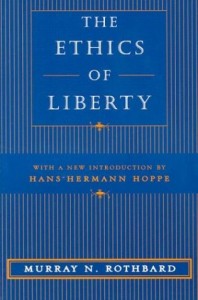Rothbard's Ethics of Liberty, Rights Theory
Reading The Ethics of Liberty, Part 3 – Rothbard’s Confusion About Self-Ownership
 In the previous post in this series, I discussed the natural law foundation of Rothbard’s Ethics of Liberty, and suggested that it runs into difficulties with David Hume’s famous “is-ought” problem. In this post, I move on to chapter six of Rothbard’s book, and argue that his continuing conflation between normative and descriptive claims leads him into a serious confusion about a concept that constitutes the foundation of his political-moral theory: the concept of self-ownership. There are other problematic discussions in this chapter too – his argument for free will, for instance, and his claim that the objective moral value of life cannot be denied without self-contradiction. But for reasons of space, I must pass over these topics here.
In the previous post in this series, I discussed the natural law foundation of Rothbard’s Ethics of Liberty, and suggested that it runs into difficulties with David Hume’s famous “is-ought” problem. In this post, I move on to chapter six of Rothbard’s book, and argue that his continuing conflation between normative and descriptive claims leads him into a serious confusion about a concept that constitutes the foundation of his political-moral theory: the concept of self-ownership. There are other problematic discussions in this chapter too – his argument for free will, for instance, and his claim that the objective moral value of life cannot be denied without self-contradiction. But for reasons of space, I must pass over these topics here.
Rothbard begins Part II by trying to do for ethics what his mentor Ludwig von Mises did for economics: to build it up, step by step, starting with the “Crusoe” case of “an isolated man face-to-face with nature” (29). By examining such a case, Rothbard thinks, we can get clear on fundamental ethical concepts like “ownership,” “freedom,” and “value” in their simplest form. The additional complexities that come with interpersonal relations can then be considered later, once these fundamental concepts are firmly in place.
When we examine the case of Crusoe, Rothbard claims, we are confronted with a number of “inescapable,” “natural facts.” Crusoe has only his own body to rely upon; he has no instincts to tell him automatically how to live; there are various natural resources that can be used to satisfy his desires, some in their raw form, some only after having been transformed by human effort. Crusoe must produce before he can consume, and reason is his means of survival (30).
Fair enough, so far. But where in this catalogue of natural facts are we to find morality? Where is the “ought,” the normativity that is the characteristic mark of moral and political thought? For Rothbard, the key transitional concept is ownership. For when Crusoe examines his own situation, Rothbard claims, he discovers “the natural fact of his mind’s command over his body and its actions: that is, of his natural ownership over his self” (31).
Self-ownership, for Rothbard, is a natural fact, constituted by our control over our self (our body and our actions). My body is mine because I alone determine how it moves and what it does. And so self-ownership extends naturally to ownership over external goods. For by “mixing our labor” with the land, we come to have control over it, too. And our property in it extends only so far as our control extends – to stand on the shore of a new continent and claim ownership over the entire thing would be “empty vainglory” (34). True property in external goods is equivalent to actual control over them (34).
There is, however, a serious confusion at work in this argument. It is a confusion that stems partly, I think, from Rothbard’s Crusoe methodology. Part of the greatness of Human Action is how well that approach works for the analysis of economics. Mises is able to show that even economic concepts that seem essentially interpersonal, like that of “exchange,” are really fundamental features of human action discernible even in the case of “autistic” action.
But it’s just not clear that you can do this with ethical concepts like “ownership.” And that’s because ownership really is an essentially interpersonal concept. To claim ownership over a thing – or over one’s self! – is to make a claim against others. It is to claim, at a minimum, that they must refrain from interfering in your use of the thing.
That kind of interpersonal claim is the essence of property. Without it, you simply don’t have property. A thief might control the purse he has stolen from you, but he doesn’t own it. Your ownership of the purse, in contrast, isn’t defeated by the fact that the thief is now controlling it. What gives you ownership is not actual control, but the normative right to control.
I’m not saying that Crusoe doesn’t own himself, or the nuts and berries he mixes his labor with. I’m saying that Rothbard hasn’t shown that he does. Pointing to the “natural fact” that Crusoe controls himself and his berries does not establish that he owns them in the sense of having a moral claim against others. To think that it does is to confuse the “is” of what Crusoe possesses with the “ought” of what he has a right to possess.
Unfortunately, Rothbard proceeds to argue in the chapters that follow as if he had established the normative claims of self-ownership and ownership of external goods. Indeed, his entire understanding of the free society is based on these concepts (40). And so, the oversight here is not a minor one. It is, instead, absolutely fatal.
But there is, perhaps, one glimmer of hope for Rothbard. For in chapter 8, Rothbard returns to the idea of self-ownership and provides what appears to be a separate and entirely independent argument for it. I’ll explore that argument – soon! I promise – in the next installment of this series.

